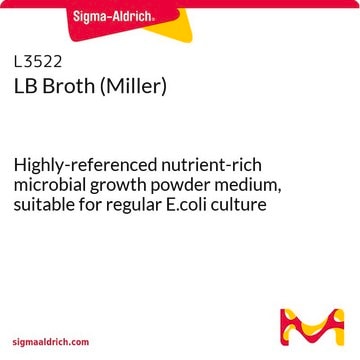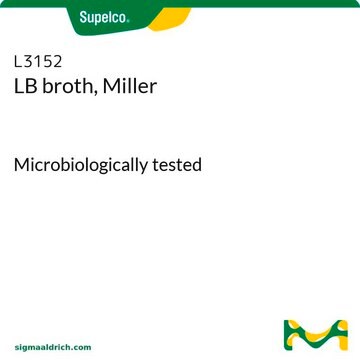Each of the broths will likely grow E. coli very well, but there are still general guidelines for choosing a broth when you are working without a protocol. Generally:LB - Miller and LB - Lennox are used for E. coli growth and maintanence, DNA plasmid production and protein production. The Lennox formulation has a lower salt content required for some salt-sensitive selection antibiotics.LB - Luria low salt is used for special applications where the E. coli growth or other constraints require the lowest possible salt content.Terrific Broth is used for higher yield protein production and high yield DNA plasmid production, because of the faster growth of the E. coli in this medium.SOB is used for protein production, DNA plasmid production and the generation of high-efficiency competent cells.SOC is used for initial growth of competent cells and the transformation procedure.
L7025
LB Broth with agar (Lennox)
Tablet microbial growth medium
Synonym(s):
LB Agar, LB agar
Select a Size
$154.00
In StockDetails
Select a Size
About This Item
$154.00
In StockDetails
Recommended Products
grade
for molecular biology
Quality Level
sterility
non-sterile
form
tablet
technique(s)
microbiological culture: suitable
application(s)
food and beverages
microbiology
storage temp.
room temp
suitability
nonselective for Escherichia coli
nonselective for coliforms
General description
Application
Features and Benefits
- A budget-friendly alternative to pre-poured plates
- Convenient small package to eliminate weighing
- Fast preparation – no stirring required
Components
9.14g/L Tryptone
4.57 g/L Yeast Extract
4.57 g/L NaCl
1.6g/L inert binding agents
Reconstitution
Legal Information
related product
Storage Class
11 - Combustible Solids
wgk_germany
WGK 2
flash_point_f
Not applicable
flash_point_c
Not applicable
Choose from one of the most recent versions:
Certificates of Analysis (COA)
Don't see the Right Version?
If you require a particular version, you can look up a specific certificate by the Lot or Batch number.
Already Own This Product?
Find documentation for the products that you have recently purchased in the Document Library.
Customers Also Viewed
Protocols
General protocols for growth of competent cells in microbial medium.
-
Which bacterial culture medium is the best choice for my application?
1 answer-
Helpful?
-
-
Will adding magnesium to the culture medium increase cell density?
1 answer-
In microbial broth formulations that do not already contain magnesium, the addition of 10-20 mM MgCl2 or MgSO4 may increase cell densities. You may need to also increase the shaking speed of the incubator.
Helpful?
-
-
What is the difference among the many LB - Lennox products?
1 answer-
LB - Lennox is available in many types to suit your needs. The different product formats include powder, EZMix™ powder, and tablet form. Each of these forms are available with and without agar for easy LB-agar plate preparation.L3022 (LB Lennox powder)L2897 (LB Lennox powder with agar)L7275 (LB Lennox tablets)L7025 (LB Lennox tablets with agar)L7658 (LB Lennox EZMix(TM) powder)L7533 (LB Lennox EZMix(TM) powder with agar)L5542 (LB Lennox pre-poured agar plates)
Helpful?
-
-
What is the Department of Transportation shipping information for this product?
1 answer-
Transportation information can be found in Section 14 of the product's (M)SDS.To access the shipping information for this material, use the link on the product detail page for the product.
Helpful?
-
-
What are the differences among the Luria, Lennox and Miller LB formulations?
1 answer-
LB, (originally termed lysogeny broth) was initially composed of tryptone, yeast extract, NaCl and glucose. Soon after, the glucose was omitted (Miller's version), and later the NaCl content lowered by half (Lennox's version). For some applications, even lower salt is required (Luria's low salt version).
Helpful?
-
Active Filters
Our team of scientists has experience in all areas of research including Life Science, Material Science, Chemical Synthesis, Chromatography, Analytical and many others.
Contact Technical Service












